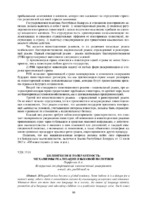| dc.contributor.author | Парфенюк, К. А. | ru |
| dc.coverage.spatial | Минск | ru |
| dc.date.accessioned | 2018-03-28T12:41:10Z | |
| dc.date.available | 2018-03-28T12:41:10Z | |
| dc.date.issued | 2017 | |
| dc.identifier.citation | Парфенюк, К. А. Билингвизм и толерантность: механизмы реализации языковой политики / К. А. Парфенюк // Новые горизонты – 2017 : сборник материалов Белорусско-Китайского молодежного инновационного форума, 2-3 ноября 2017 г. : в 2 т. – Минск : БНТУ, 2017. – Т. 2. – С. 80-82. | ru |
| dc.identifier.uri | https://rep.bntu.by/handle/data/39528 | |
| dc.description.abstract | Bilingualism has become a global tendency. Some believe it is a danger for a nation's unity; others claim it consolidates nations by encouraging acceptance and tolerance. Whenever there are more than one language in a society, the issues of language identity, promotion of a language and educating children in a particular language arise. Such issues by themselves do not lead to social instability. It’s the suppression of bilingualism with aggressive assimilation that incites conflicts. Language is an integral part of national culture and identity. That’s why equitable bilingualism may be viewed as a vital human society’s integration mechanism. It guarantees favorable conditions for the interrelation and mutual enrichment of cultures, and this eventually leads to tolerance and political stability. | ru |
| dc.language.iso | ru | ru |
| dc.publisher | БНТУ | ru |
| dc.title | Билингвизм и толерантность: механизмы реализации языковой политики | ru |
| dc.type | Working Paper | ru |
| dc.relation.book | Новые горизонты - 2017 | ru |

